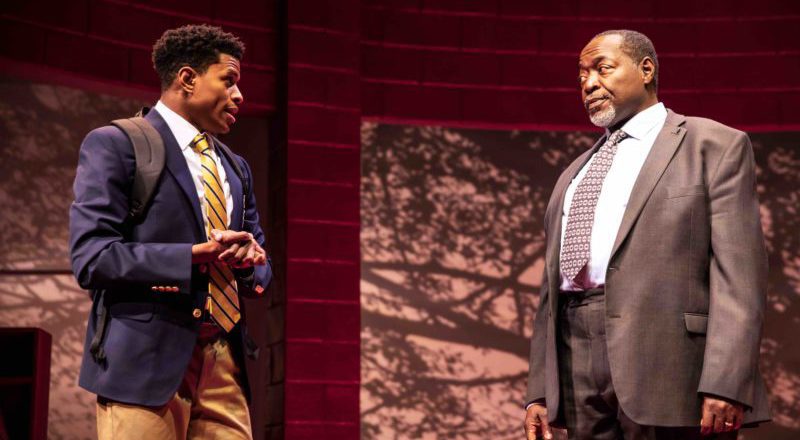INTERVIEW: Learning about tolerance, inclusion in ‘Choir Boy’
Photo: From left, Jeremy Pope and Chuck Cooper star in Choir Boy on Broadway. Photo courtesy of Matthew Murphy / Provided by BBB with permission.
Choir Boy, the play by award-winning writer Tarell Alvin McCraney, is currently in the middle of a celebrated extended run at the Samuel J. Friedman Theatre on Broadway. The Manhattan Theatre Club production, directed by Trip Cullman, stars a talented cast of actors, including Jeremy Pope as Pharus Jonathan Young, a young choir singer who faces discrimination from his fellow students for being gay.
The heart of the play deals with tolerance and inclusion, and how these young men must learn from Headmaster Marrow (Chuck Cooper), their teacher (Austin Pendleton) and, most importantly, from one another.
The setting is the Charles R. Drew Prep School for Boys, an elite institution that has been dedicated to the education of strong, ethical black men. Pharus is living his dream by attending the school, especially when he has been tasked with leading the choir, but preventing him from enjoying these formative years is a small group of fellow choristers who have trouble accepting him. They want him to be a “proper” Charles R. Drew graduate, but Pharus wants to live on his own terms.
Cooper, who plays the headmaster character, is a Tony winner for his performance in Cy Coleman’s The Life. He has been on Broadway in a number of productions and is also a frequent presence on television, having guest starred in Bull, Power, The Good Wife, House of Cards and Madam Secretary.
“It was a massive, collaborative lovefest is what it was,” Cooper said in a recent phone interview. “Tarell was in the room very often, and it was a massive collaboration. He brought what he brought. Trip brought what he brought. We all brought what we brought, and we all talked about it and discussed it and fleshed it out. Obviously, it’s Tarell’s play, and his vision superseded any decisions that were made. But that said, it was totally a very open, collaborative process.”
To help Cooper understand the headmaster role, he conducted an exercise that he does for most of his theatrical roles. He looked at the script and read all the dialogue the character says aloud. Then he looked at the script again and read all the dialogue that is said about the headmaster by the other characters.
“And I try to come up with something that’s truthful and has relevance to what’s going on around me,” he said. “I think a message of tolerance and inclusion is critically important on Broadway. It’s important everywhere.”
It has been enlightening and enjoyable to bring this play to life with a talented cast of relative newcomers. Cooper was quick to point out that he stands behind these young men, who he described as “triple threats.”
“I mean, they sing, they dance, they act all very well, and my job is to support that and to hopefully create a base for them to stand on and shine,” he said. “It’s been wonderful to witness this next generation of artists come along so strong and so inspiring.”
Cooper became seriously interested in theater and acting during his first year of college. He knew he wanted to move his career into a field that he enjoyed, but he didn’t know much more beyond that.
“Luckily in my freshman orientation, I had a professor from the School of Theatre, and he just basically steered me toward the School of Theatre based on my interests,” Cooper said. “I had sung in choir in high school, and I had been around theater all my life. My parents acted in Karamu House in Cleveland, Ohio, which is one of the oldest community theaters in the country. I went to nursery school there, so I grew up in the theater. And so when I tried the freshman track of theater at Ohio University in Athens, Ohio, it kind of clicked. I met with success. I met with encouragement.”
Since those initial days, Cooper has crafted an illustrious career that has seen him practice his trade in comedies, dramas and musicals. He has many professional highlights, and it would appear the success of Choir Boy is only adding to that list.
This play is particularly important and memorable because McCraney’s show promotes a message of inclusion and also provides an evening of cutting-edge drama and wondrous music. Broadway audiences are being inspired by the message of Cooper’s character and the young men who bring energy to the school’s gospel choir.
“The theater teaches empathy, and so as the theater evolves and is able to tell more diverse stories, the degree of sympathy that we promulgate evolves,” Cooper said. “And so, yes, it is of great importance that these stories and others be told, and that is evidenced by the reception that we get. People need stories. People have needed stories since we gathered around campfires and discussed how the hunt went down that day. We need it as a culture. We need it as a society, and us as individuals, we need the journey of a story and the subsequent empathy that it engenders.”
By John Soltes / Publisher / John@HollywoodSoapbox.com
Choir Boy, starring Chuck Cooper, is now playing the Samuel J. Friedman Theatre on Broadway. The Manhattan Theatre Club production continues through March 10. Click here for more information and tickets.

